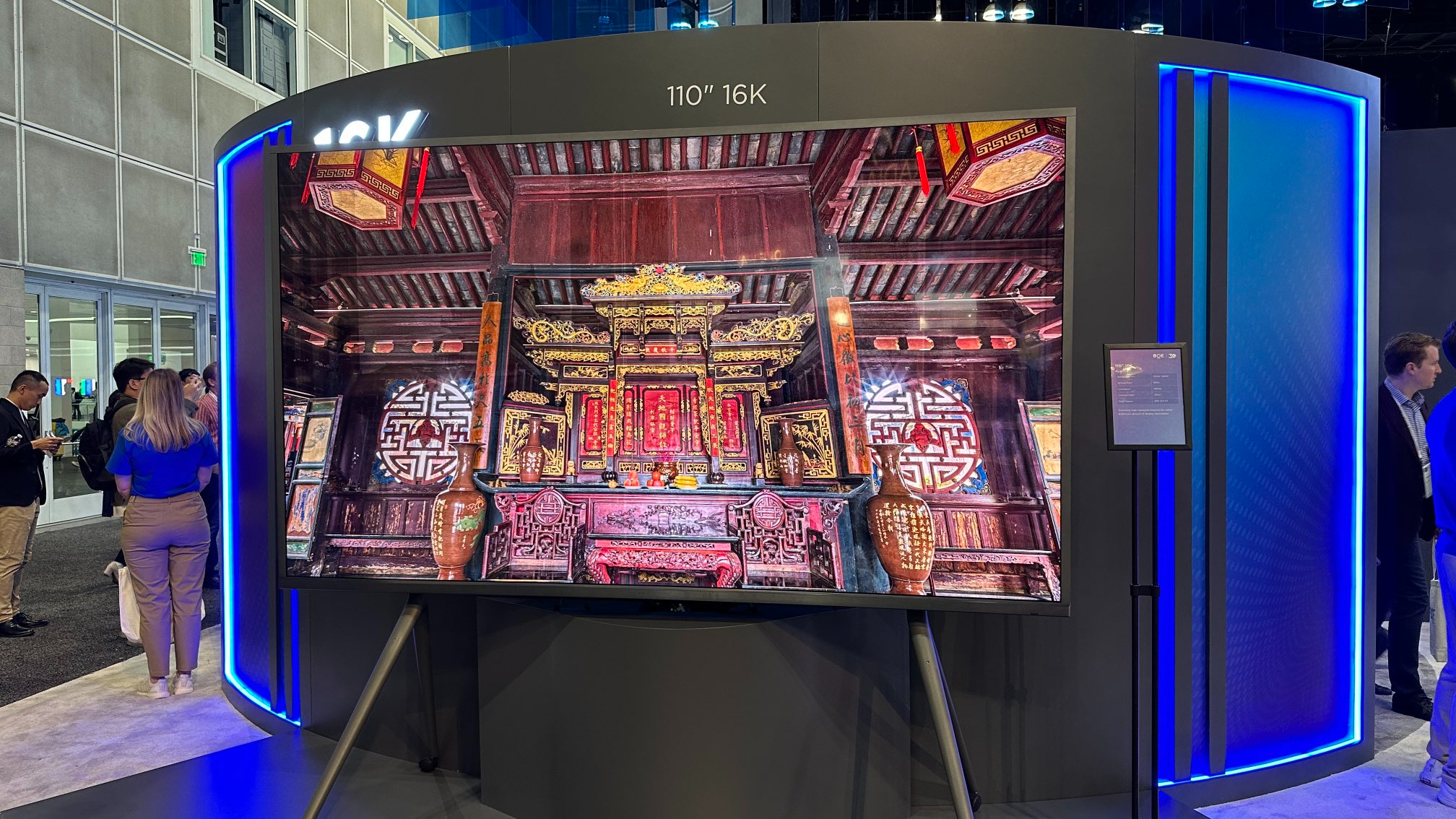BOE's Insane 110-inch 16K Display Humbles Even the Mighty RTX 4090
16K resolution gaming would bring even a GeForce RTX 4090 to its knees

4K monitors are commonplace these days, and 8K monitors are readily available — albeit with exorbitant price tags (the Dell UltraSharp 32 8K Monitor costs just over $4,000). But, of course, we can't be happy with "just" an 8K resolution display, as witnessed by the latest creation from BOE. The Chinese display giant was on-hand at Display Week 2023 and showcased a massive 110-inch display with a staggering 16K resolution.
To put that resolution in perspective, 8K is 7680 x 4320, while 16K boosts that to 15360 × 8640. So we're looking at 132.7 million pixels compared to 33.2 million pixels for 8K and 8.3 million pixels for 4K resolution. With that many pixels to push, you won't be surprised to learn that BOE's display only has a 60Hz refresh rate.
If you could find the space for a 110-inch display on your living room wall, BOE says that you'll be subject to a maximum of 400 nits brightness and a 1,200:1 contrast ratio, which is about average for an IPS panel. In addition, the 16K display covers 99 percent of the DCI-P3 color gamut.
While we didn't have hands-on experience with the BOE's display, Vincent_Teoh, who captured the image at the top of the page, said that pixels were not visible even when peering close to the display. That would mesh with BOE's claim that its 16K display offers "Extremely high resolution beyond the retina."
Now before you get any ideas about hooking this monitor up to your bodacious AMD Ryzen 7 7800X3D processor backed by an Nvidia GeForce RTX 4090 GPU, you'd likely be unable to push any serious fps at a 16K resolution in games like Cyberpunk 2077 or Microsoft Flight Simulator. Considering that you're shoveling 16 times more pixels at 16K than 4K resolution, those previously fluid frame rates would likely drop into slideshow territory.
We must also point out that BOE's 16K is just a prototype unit built to wow the crowds at Display Week 2023 — we're still years away from such a product being viable for large-scale production.
Get Tom's Hardware's best news and in-depth reviews, straight to your inbox.

Brandon Hill is a senior editor at Tom's Hardware. He has written about PC and Mac tech since the late 1990s with bylines at AnandTech, DailyTech, and Hot Hardware. When he is not consuming copious amounts of tech news, he can be found enjoying the NC mountains or the beach with his wife and two sons.
-
Dave Haynie The RTX4090 is only speced to support four 4K or two 8K displays at a time. I think you're going to need two of them to drive a single 16K display, and that only if it's actually configured as four separate 8K inputs (very early 4K displays had the option to be treated as four FHD displays).Reply -
10tacle Regarding 8K TVs, a friend of mine scored a 65" Samsung one on a Black Friday event last year for $1400 (USD). You can find them in that size all over for $1600 and a 55" for $1400. That said, I could tell no difference from my LG 4K OLED as far as pixel video tests. It didn't pop to me like going from 1080p to 4K, or even on PC gaming from a 1080p monitor to a 1440p monitor.Reply
I'm a firm believer that the human eye has a diminished returns capability of seeing ever more increased pixel density resolutions and we've hit it at 8K. Now the larger the screen that's a different story of course, but not everyone has a living room capable of managing a 85" TV which is where an 8K TV would make the difference over a 65", or a 110" 16K over a 85" 8K. -
atomicWAR Reply
Something has to go with that golden toilet you borrowed from Blenheim Palace am I right?Ivanpua said:I'm going to order 4 of these, I need a 32k screen for my bathroom wall. lol
https://www.nytimes.com/2019/11/20/arts/design/gold-toilet-america.html
/s -
Adaptation Reply
Yes Mildred Montag.Ivanpua said:I'm going to order 4 of these, I need a 32k screen for my bathroom wall. lol -
sayhellotomy45 Reply
You mean is it just like stitching 4x 8K panels together? The answer to that is yes, and the reason it's that size is because on a 110-in 16K display individual pixels become indistinguishable from more than 21 inches away.wr3zzz said:Given the size of this thing isn't it just like stitching 4x 4K panels together? -
bit_user Reply
This. I still have a 1080p 65" TV that I'm going to keep until it dies. I sit just about at the limit of where I can distinguish individual pixels, so it seems like going to 4k, before then, would be a waste.10tacle said:Regarding 8K TVs, a friend of mine scored a 65" Samsung one on a Black Friday event last year for $1400 (USD). You can find them in that size all over for $1600 and a 55" for $1400. That said, I could tell no difference from my LG 4K OLED as far as pixel video tests. It didn't pop to me like going from 1080p to 4K, or even on PC gaming from a 1080p monitor to a 1440p monitor.
I'm a firm believer that the human eye has a diminished returns capability of seeing ever more increased pixel density resolutions and we've hit it at 8K.
My PC at work has 4k @ 32" and it's borderline too small for the font sizes I liked at 2.5k @ 27". To get the same DPI, I'd need a 4k monitor @ 40". For a work monitor 40" is almost too big. Maybe 35-36" would be a decent compromise.
Anyway, the reason I'm posting here is that the killer app for these high-res panels is lightfield tech, IMO. Not that there's a huge market for lightfield displays, but it's something you need a ton of native resolution, to do well.
https://lookingglassfactory.com/product-overview
That's because once you add a microlens array, it cuts the resolution by about 1/5th to 1/9th in each direction. So, your 16k 2D display suddenly becomes a 2k or 3k lightfield display.